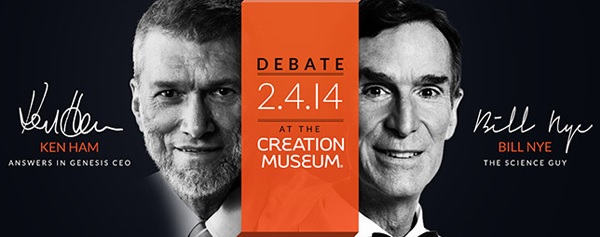I have to admit I’m actually a bit excited about the upcoming evolution/creation debate featuring Bill Nye and Ken Ham. (I’m also a bit shocked that I just linked to an Answers In Genesis page.)
Many people are not happy the debate is taking place. Google “Why I won’t debate creationists”, and you’ll find thousands of hits, with the top few linking to a famous article written by Richard Dawkins. Dawkins’ main reason to avoid such debates (a reason shared by many others) is that a debate could give the illusion of an equal footing between creationists and professional scientists. Interestingly enough, this sentiment is expressed very well in one of my favourite Bible verses:
Answer not a fool according to his folly, lest you be like him yourself. (Proverbs 26:4, ESV)
There is also the risk that the existence of a public debate (ie, an event where people stand up arguing with each other) could give the illusion of the existence of a scientific debate (where scientists of differing viewpoints are publishing legitimate scientific articles for and against evolution).
Many people, including Dawkins in the above article, have made these points very eloquently, so I won’t say any more about that perspective. I completely get it, and think it is a very valid point. Here, rather, I want to give some reasons for considering the other viewpoint. Again, the Bible has some wisdom on this:
Answer a fool according to his folly, lest he be wise in his own eyes. (Proverbs 26:5, ESV)
You’re damned if you do and you’re damned if you don’t. It’s right there in the Bible.
One of the biggest problems about refusing to debate creationists (or intelligent design theorists, climate change deniers, anti-vacciners, etc) is that the creationists will claim a victory from this – they’ll say the scientists are scared and don’t want to be shown up in public. I don’t think the scientists are scared: certainly not of being wrong, and certainly not of evolution being shown up. But everyone knows you can be right and still lose a debate (ie, an argument) if your opponent has polished debating skills. And everyone also knows that creationists focus an enormous amount of attention on their debating tactics.
Creationists have traditionally done well by using techniques such as the Gish Gallop, wherein the creationist “drown[s] the opponent in such a torrent of half-truths, lies, and straw-man arguments that the opponent cannot possibly answer every falsehood in real time”. At the end, the creationist proudly counts the number of unanswered points he made, and claims victory. The logic behind the technique is that it only takes a few seconds to declare “There are no transitional fossils, radiometric dating doesn’t work, Darwin converted to creationism on his deathbed, evolution is responsible for the Holocaust, evolution can’t explain the origin of life or the universe, all mutations are harmful”, while it would take ages to adequately explain why these assertions are misguided or just plain untrue.
To beat a creationist in a debate, one would have to be well aware of all their techniques, and have solid plans for how to expose and combat them. Strangely enough, most professional scientists simply don’t have the opportunity or inclination to spend years honing their debating techniques – they have experiments to perform, papers to write, grants to win, conferences to attend, students to teach, universities to run. Creationists, on the other hand, are free to spend their lives sharpening their debating skills, and poring over journal articles trying to find a sentence they can twist to suit their purposes.
With all that said, there have been a few good debates – including this somewhat informal one featuring Dawkins himself – and hopefully there will be plenty more, as I think there is actually a lot to be gained by engaging with the creationists. For one thing, most people familiar with the evidence for evolution find the creationist arguments conducive to laughter – or tears in some cases. For someone on the fence, if two equally skilled debaters squared off, it wouldn’t be too difficult to see the difference between a professional scientist and a professional charlatan. So I don’t think there is too much risk of casualties on the side of science. The real opportunities lie with the other segment of the crowd.
I imagine most people interested in such debates will be creationists, hoping to see their hero demolish a God-hating atheist scientist. Some creationists have their fingers so far in their ears it would be impossible to sway them. And some of them are perfectly happy to admit this, as the infamous quote from Kurt Wise attests:
[Even] if all the evidence in the universe turned against creationism, I would be the first to admit it, but I would still be a creationist because that is what the Word of God seems to indicate.
But many creationists would be surprised to hear about evolution from an actual real live evolutionary scientist. They’d have heard so many straw men about radiometric dating techniques and canyon-forming flash floods, and be so familiar with mantras like “There are no transitional fossils” and “All mutations are harmful”, that it’d be a total shock to hear that what they’d been taught by their creationist heroes was total bollocks. (I remember the feeling when I discovered that Christian apologists often distort the truth and even spread lies – it was a massive turning point.) Simply discovering that evolutionists are not the evil fraudsters they are made out to be by creationists would make plenty of people think. And so would the idea that it might be worth reading a book by Dawkins or Prothero or Coyne, instead of getting their information on evolution from the likes of Banana Man.
I really hope Bill Nye does well in his debate. A lot of good could come out of it.

